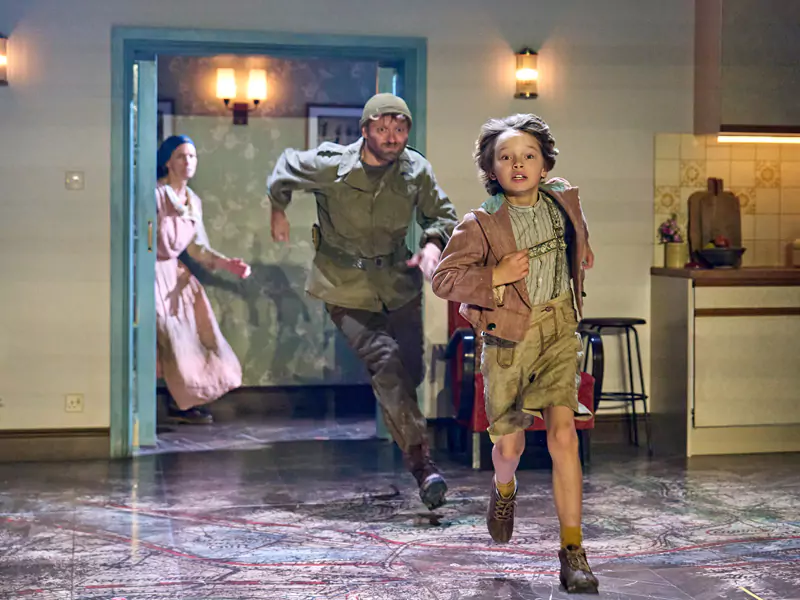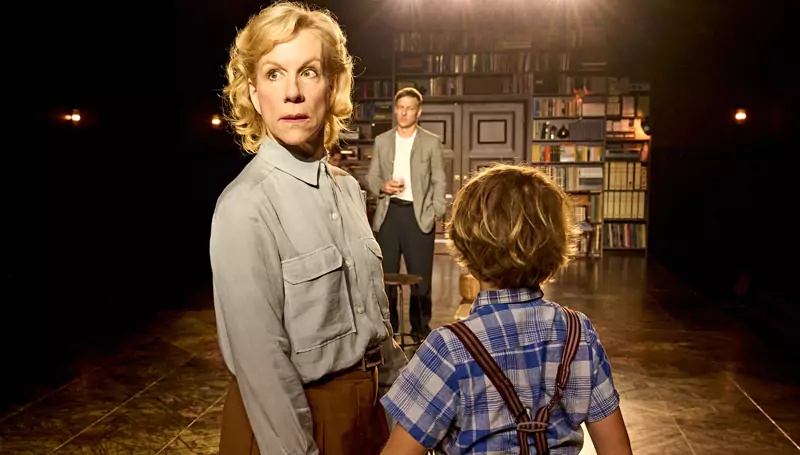“The Land of the Living” at the Dorfman, National Theatre
Franco Milazzo on the South Bank
21 September 2025
★★★
With his first play in 30 years, David Lan plunges us into the immediate aftermath of World War Two and the fate of the displaced children left behind in Germany after the fall of the Nazis.

Cosima Shaw, Hubert Hanowicz and Artie Wilkinson-Hunt.
Photo credit: Manuel Harlan.
Lan hasn’t exactly been resting on his laurels for the last three decades. From 2000 to 2018, he was the artistic director of the Young Vic and was responsible for a raft of influential plays that highlighted global social ills and issues. Since stepping away from the Waterloo theatre, he has tackled several projects away from the stage including the global tour of Little Amal, an 11-foot puppet representing a nine-year Syrian girl looking for her parents.
There is something of Amal and her plight in his new play which centres on two characters. In 1945, we meet 20-year-old United Nations Relief and Works Agency (UNRWA) employee Ruth (Juliet Stevenson). Picking her way through the ruins of Germany, she is trying to find housing for youngsters abandoned after the collapse of the Nazi regime. While doing so, she uncovers a dark government plot to gather “perfect” children from around the country and the Slavic regions to raise as “Aryans”. She finds herself drawn to one particular boy: the precocious nine-year-old Thomas who, after being taken from his birth parents in Poland, has been adopted by local farmers. Forty-five years later, Thomas visits her to ask why she eventually abandoned him when he was ten; in response, she recounts their dark history from her own point of view.
We follow Ruth as she takes over a German castle, its state of disrepair and current aristo occupants just two more challenges she blazes her way through with a determined manner. When it comes to where her charges will eventually end up (somewhere in the West or taken away by the incoming Russian forces), she deliberately decides not to decide for them and allows the children to make their own choice. Lan – informed by his conversations with journalist Gitta Sereny – opens up the tough and pragmatic Ruth enough for us to examine the various moral dilemmas she faces. Each inevitably begs the question: what would we have done differently in that situation?
As superb as Stevenson is here, she is outshone by the combined efforts of Artie Wilkinson-Hunt as the younger (on press night) and Tom Wlaschiha (Game of Thrones’ mysterious Jaqen H’qhar) as the older Thomas. Under Stephen Daldry’s steady direction, the former is an effervescent force who – when not smashing plates, breaking chairs or screaming his head off while speeding around – spouts German, Polish, and even bits of broken English to those around him. It’s a major role that demands much and yet Wilkinson-Hunt carries it off superbly.
Wlaschiha for his part spends much of the time looking on, a mute witness to Ruth’s struggle to keep the children safe and well away from the well-armed Russians. Even when silent, his face and occasional movements are masterpieces of silent expression, displaying by turns wonder, horror and deep sadness. And when eventually he does take centre stage, he becomes a veritable volcano erupting with the rage he has held in over the intervening decades.
Miriam Buether’s magnificently descriptive traverse stage – covered in a map of Germany and bookended by a modern library and a Forties-era kitchen – does much of the heavy lifting in terms of setting the time and place of each scene. That’s not to say Lan doesn’t provide hints and reminders alongside swathes of expositions. The luminous lighting and atmospheric sound from James Farncombe and Gareth Fry, respectively, thrust us effortlessly from farmland and the Gothic interior of the castle to the intimate space of Ruth’s study.
Where The Land of the Living falls flat is in the way it drags us through the morass of facts and events as well as the overall story pacing: spoonfeeding your audience is one thing, doing it with a snuff spoon is another. Despite the near three hours running time, no one outside Thomas, Ruth, and her adorable Salvation Army assistant Dora (Kate Duchêne) gets more than the cookie-cutter treatment. Terrifically staged set pieces like the train escape come too late for us to care overly about the eventual outcome. The overall effect is to deaden our emotional engagement with both characters and events leading to many of the more dramatic scenes lacking serious punch. This work’s luxury length and shallow characterization suggests two things: that this may have worked better as a film or TV series; and that Lan needs to hire a new script editor.
In an ideal world, the hyper-relevant and urgent topics in this play should be leading to sustained media attention and widespread public outrage. According to a 2023 story in The Economist, around one in five Ukrainian children is living under Russian control, either in occupied areas or Russia itself. The current head of UNRWA Philippe Lazzarini estimates there are “at least 17,000 unaccompanied and separated children” in Gaza. The international community should come together to help displaced children everywhere – but very sadly, there is little sign of that happening.









